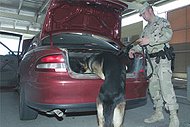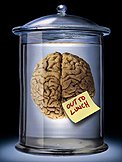 ...Aparently. According to a recent article in The Independent, soon Britain will be putting into place a system of cameras that can recognize car license plates. Computers will then keep a record of every single car and where it travels, going back several years. Further software analysis of the data will be able to tell the government which cars associated with which the most. In addition, the system will keep track of who is late on registration fees and other such details.
...Aparently. According to a recent article in The Independent, soon Britain will be putting into place a system of cameras that can recognize car license plates. Computers will then keep a record of every single car and where it travels, going back several years. Further software analysis of the data will be able to tell the government which cars associated with which the most. In addition, the system will keep track of who is late on registration fees and other such details.If the British government looks at driving in the same way as the U.S. government, then they view driving as a "privilege - not a right". This seemed perfectly reasonable back when cars were first coming out and still fairly rare.
But this perspective has developed over time to have a number of modern consequences that would otherwise be unthinkable in other areas of our life. For example, the government can deny motorists the right to drive in certain areas, can take away driving 'privileges', can monitor and search, conduct roadside checkpoints, demand to see our 'papers' at any time (which we are required to carry) and so on. Many of these activities would be viewed as totalitarian if applied to people walking on the sidewalk.
Unlike the days when motor vehicles were 'special', the ability to drive is now crucial to mobility in many areas of both nations. Evidently, this evolution has happened slowly and insidiously with the growth of automobile use and dependency. That being the case, our very mobility and means of livelihood has now ended up a "privilege" in the eyes of the government.
Given the modern role that driving plays in today’s world, retaining this 'privilege, not a right' policy on driving would be harmful enough to our liberty. But to make matters worse, this entire matter that has evolved concerning automobiles has a degrading and perverting effect on all of our other rights. When you take the unusual as a privilege, and then it becomes usual, it tends to make citizens and government alike start to treat other usual activities as a privilege instead of a right.
For example, once people get accustomed to the privilege-based restrictions and governmental powers associated with their car or their driving, they then think, "what's the difference between having a checkpoint on the road or on the sidewalk?" or "what's the difference between requiring me to carry my ID inside my car, or inside my friend's house?"
You have whole generations of people, myself included, who grew up in a world where cars were not a special privilege, but a common and crucial element to our mobility and freedom of movement. Yet, we also grew up in a world where the government treats that mobility as a privilege. The result is a world the founding fathers would have considered nightmarish, and we go along with it because the mantra of "driving is a privilege" has been such a long-running theme. In the meantime, we grow up accustomed to a government with powers far beyond those intended - all because of the quirky evolution of our perceptions regarding one invention, which later evolved into a necessity of civilization.
Back to the article, here is an example of how clueless even the writer is...
"But others concerned about civil liberties will be worried that the movements of millions of law-abiding people will soon be routinely recorded and kept on a central computer database for years." (bold mine)
They will be "worried" that the movements of millions of law-abiding people will soon be routinely recorded? How do you "worry" about something that you're being told IS happening? There is no "worry" it will happen - it's happening, period.
There's no question that they're going to catch some more bad guys with this. But, in order to circumvent this billion-dollar system, all a criminal has to do is put a fake or stolen license plate on his car right before driving out to commit the crime. Meanwhile, all of the law-abiding people are having their privacy violated and being held to the grindstone over nitty-gritty details such as registration being a day late. "Is the benefit worth the cost?" is rarely a question governments will ask when the cost involves only loss of liberty. It's up to people to ask that question.
When it comes to other uses this system might have in more secretive agencies, Chief Constable Frank Whiteley said,
"The security services will use it for purposes that I frankly don't have access to."One can only imagine.







